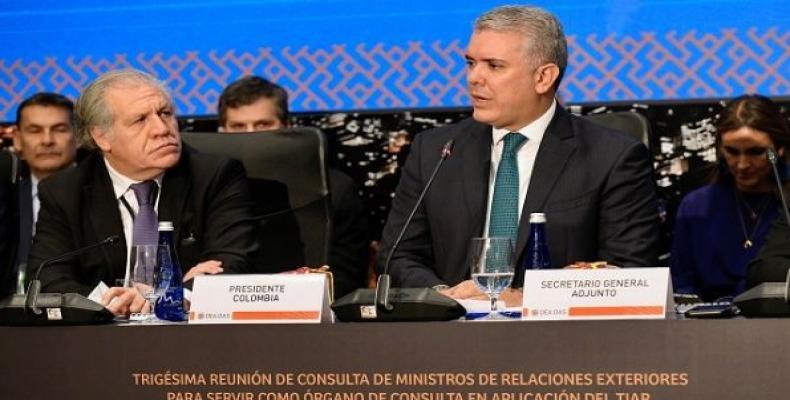Caracas, December 4 (RHC)-- Venezuelan Foreign Minister Jorge Arreaza has condemned the activation of measures on sanctions against officials of the Venezuelan government during the meeting of the Inter- American Treaty of Reciprocal Assistance (Rio Treaty), which was held in Bogotá on December 3.
Arreaza said that some of the allied regional governments of the United States seek to push for war against Venezuela by "inventing lists" aggressors. The Venezuelan foreign minister recalled that several of the countries that support the U.S. in their aggressions against Venezuela are immersed in popular mobilizations against the neoliberal policies applied by their presidents.
The TIAR is a mechanism that the administration of Donald Trump has tried to apply against Venezuela to overthrow the Bolivarian Revolution and thus justify all the sanctions and economic blockades that apply to the South American country.
The meeting was attended by the foreign ministers of Argentina, Brazil, Chile, Colombia, Costa Rica, El Salvador, the United States, Guatemala, Haiti, Honduras, Panama, Paraguay, Peru, the Dominican Republic and Trinidad and Tobago. However, Mexico and Panama refused to join the measures against the Government of President Nicolás Maduro.
The representative of Panama before the OAS, María Roquebert said: “Panama requests that the legal systems of each country be followed” and in its specific case, “the necessary documentation and evidence on those designated by the competent authorities must be received to that, according to Panamanian legislation, investigations can be expedited, and thus establish the corresponding sanctions and consequences.”
“The list of people who are asked to apply sanctions was prepared by a group of countries such as Colombia and Brazil, of which Panama was not part; therefore, like other delegations, we have requested to receive the proper documentation that supports the inclusion of the members subject to sanctions, which so far has not been received,” details a statement from the Panamanian Foreign Ministry.
For his part, the Undersecretary for Latin America of the Mexican Foreign Ministry, Maximiliano Reyes Zúñiga, said that his government rejects any action taken within the framework of the TIAR. Zúñiga recalled that the solution to settle differences between countries and governments has to be diplomatic and not coercive.


